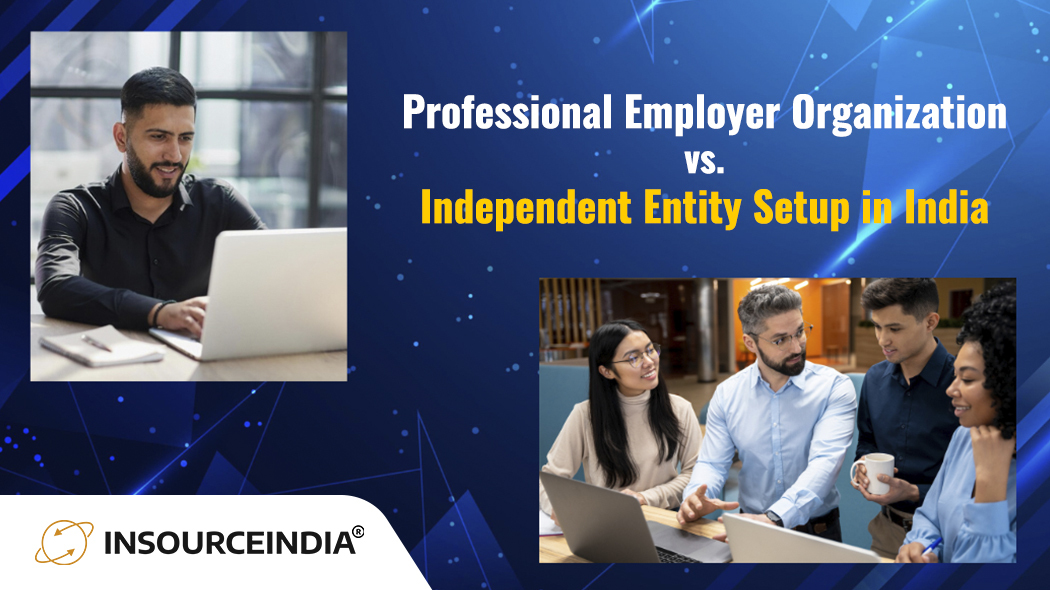In a dynamic business landscape, establishing a presence in India requires strategic decision-making regarding the structure of your organization. Two primary options for foreign companies looking to operate in India are setting up an Independent Entity or partnering with a Professional Employer Organization (PEO).
Each option has its merits and challenges, and understanding the nuances can greatly influence the success of your venture. This blog delves into the differences between these two approaches, shedding light on the benefits and considerations associated with each.
The Professional Employer Organization (PEO) Approach:
A Professional Employer Organization (PEO) is a third-party entity that takes on the role of an employer for your employees in India. Essentially, the PEO becomes the legal employer, managing payroll, compliance, and HR functions on your behalf.
This model offers several advantages:
1. Ease of Entry: Partnering with a PEO allows for a quicker market entry, as the PEO typically has existing infrastructure and local expertise.
2. Reduced Administrative Burden: The PEO handles HR tasks, payroll, benefits, and compliance, freeing you to focus on core business operations.
3. Mitigated Risk: The PEO assumes legal responsibility for employment-related compliance, reducing your exposure to regulatory risks.
4. Flexibility: Scaling up or down becomes more agile, as the PEO can adjust workforce size based on your requirements.
Considerations with the PEO Approach:
1. Limited Control: With a PEO, you relinquish direct control over HR and employee management, potentially affecting the company’s culture and operations.
2. Long-term Costs: While convenient, long-term PEO engagement might accrue higher costs compared to an independent setup.
3. Data Security: Sharing sensitive employee data with a third party raises concerns about data security and confidentiality.
The Independent Entity Setup Approach:
Setting up an independent entity, such as a subsidiary or branch office, involves establishing a legal entity in India. This entity operates as a separate legal entity from your foreign parent company. Here are the advantages of this approach:
1. Full Control: With an independent setup, you retain complete control over all aspects of your Indian operations, enabling customization of business processes and culture.
2. Brand Establishment: An independent entity allows you to build a distinct brand presence in the Indian market.
3. Long-term Cost Efficiency: While the initial setup costs may be higher, long-term operational costs could be more predictable and manageable.
4. Strategic Flexibility: You can tailor your business strategies to suit local market dynamics without external constraints.
Considerations with the Independent Entity Setup:
1. Complexity and Time: Establishing an independent entity involves legal, financial, and administrative complexities, often requiring more time and resources.
2. Compliance Responsibility: You are solely responsible for adhering to Indian labour laws, tax regulations, and other compliance obligations.
3. Resource Intensity: Operating an independent entity necessitates setting up local HR, payroll, and legal functions, demanding substantial resources.
| Aspect | PEO Approach | Independent Entity Setup |
| Entry Process | Quicker and easier market entry due to existing infrastructure and expertise of the PEO. | Involves legal, financial, and administrative complexities, potentially taking more time. |
| Control and Customization | Limited control over HR and employee management. | Complete control over business processes and culture. |
| Brand Presence | Less opportunity to establish a distinct brand presence. | Opportunity to build a distinct brand in the market. |
| Administrative Burden | PEO manages HR tasks, payroll, benefits, and compliance. | Responsible for managing all administrative tasks internally. |
| Compliance Responsibility | PEO assumes legal responsibility for employment-related compliance. | Sole responsibility for adhering to local laws and regulations. |
| Flexibility in Workforce Management | More flexibility in scaling up or down with the PEO’s assistance. | Can tailor workforce strategies without external constraints. |
| Long-term Costs | Potentially higher long-term costs due to PEO service fees. | Initial setup costs might be higher, but long-term operational costs could be more predictable. |
| Data Security | Concerns about sharing sensitive employee data with a third party. | Direct control over data security measures and policies. |
| Resource Intensity | Lower resource requirements for administrative tasks. | Requires setting up local HR, payroll, and legal functions, demanding more resources. |
| Risk Exposure | Reduced exposure to regulatory risks due to PEO’s legal responsibility. | Greater responsibility for managing compliance risks. |
| Strategic Adaptation | Limited ability to adapt strategies independently. | Full freedom to customize business strategies to local market dynamics. |
Remember that the choice between these two approaches depends on your business priorities, risk tolerance, and long-term goals for operating in the Indian market. When expanding into India, the choice between a Professional Employer Organization and an Independent Entity setup hinge on your business goals, risk tolerance, and resource availability. A PEO offers streamlined entry and reduces administrative burdens, while an independent setup provides control, brand establishment, and long-term cost efficiency. Carefully assessing your priorities and consulting with legal and business experts will empower you to make an informed decision that aligns with your strategic vision for success in the Indian market.

